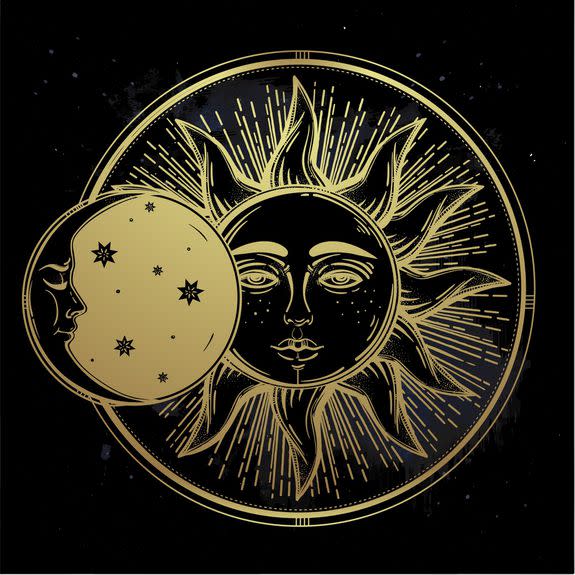The eclipse: From ancient paganism to American history, it's been a thing

Nothing reminds us that we are on a celestial island surrounded by the abyss like watching our planet's energy source turn into a gaping black hole.
But don't take my word for it. From occult and pagan lore to American history and yes, Hollywood, solar eclipses have been harbingers of doom, transformation, and revolution since time immemorial.
And can't you just ... feel it?
SEE ALSO: 20 questions you're too embarrassed to ask about the solar eclipse
At a time when the fabric of American reality appears on the verge of collapse, maybe we can take comfort in the ancient beliefs that an eclipse isn't just a phenomenon. It's a sign.
Everyone, particularly the Deadhead-like eclipse hunters called "Shadow Chasers," is blowing their lids over this particular one taking place on Monday. We are all now part of a tradition that has governed humans since the dawn of man — looking upward to remember that we are at the mercy of a cosmic dance indifferent to our inner worlds.
As one Redditor put it on the "occult" thread, the eclipse is a coming together of "light and dark, symbolizing the unification of good and evil." Other online occult experts like the Academy of the Pagan Path say that since solar eclipses "can only occur during the day, on a new moon," it's a great time to take advantage of that unique blend of energy toward "planting new seeds and ideas."
Even NASA admits that, while it may not cause any evident physical effects in people, there's something here:
The eclipse even has our no-nonsense nerds sounding like vague, prophetic philosophers.

Image: GETTY IMAGES
But NASA's right about one thing: Belief shapes reality. Wars waged in the name of religion have slaughtered millions since the genesis of society. Pagan rituals practiced thousands of years ago still inspire the same psychological effects in modern people that they did to our earliest ancestors.
So, in celebration of our astrological insignificance, let's dive into a brief, abridged human history of the solar eclipse. May your reckoning be delicious.
A tale as old as pre-history
It's hard to choose from the countless, ageless, globally-shared legends about solar eclipses. The most ancient records endure to this day, etched in stone.
Five thousand years ago, neolithic man built a circle of cairns in Loughcrew, Ireland. Despite lacking all the precise modern knowledge needed to predict an eclipse accurately, the ancient Irish created a monument that aligned with the solar eclipse of 3340 B.C.E.
A millennia before the Chinese even started using paper, they carved solar eclipses into "oracle" bones that date back to 2100 B.C.

Image: UIG via Getty Images
Eclipses were believed to be signals of turmoil, but political turmoil in particular.
In ancient Chinese culture, the sun symbolized the Emperor and the moon a dragon, so the solar eclipses was seen attacks on the ruler to be warded off. Two court astronomers were beheaded for failing to anticipate them.
Many shared this common view of solar eclipses as a devouring of divine beings. Vietnamese legends believed the culprit to be a giant frog, while the Vikings saw wolves. Hindu belief interprets eclipses as the decapitated head of the deity Rahu being chucked into the sky.
The ancient Greeks viewed the uncanny event as a sign of certain doom. The poet Archilochus described the 647 B.C.E. eclipse as such:
It could also work in reverse.
In 585 B.C., “The Battle of the Eclipse” saw the warring Lydians and Medes lay down their weapons, and end a decade-long battle in the husk of the unnatural twilight.
The truly great American eclipses
Closer to home, eclipses have been tied to events of revolution. Two reportedly occurred during the Revolutionary War, and were used to demonstrate a cultural shift away from the religious and mystical and toward the scientific.
But beyond justifying American exceptionalism, solar eclipses are embedded in the African American struggle for liberty, too.
In 1791, self-taught black astronomer Benjamin Banneker correctly calculated the eclipse date, contradicting most respected mathematicians. Banneker then sent Thomas Jefferson a mic-drop of a letter, along with a copy of his meticulous work. Banneker wrote that he was "recommending to you and all others, to wean yourselves from those narrow prejudices which you have imbibed with respect to [my brethren]."
Benjamin Banneker's Alamack, 1792. Sent to Thomas Jefferson proving Af-Ams created intellectually equal. https://t.co/TotyNGqZYM … pic.twitter.com/3UZFjCvG2M
— Leandra Bernstein (@LeandraB_sbg) August 18, 2017
And most famously — as depicted in Nate Parker's The Birth of a Nation — enslaved African-American Nat Turner interpreted one eclipse he witnessed in February 1831 as a black man's hand reaching for the sun, a sign that he should launch a revolt.
After a second eclipse in August, his plans came to fruition, and 70 freed slaves joined him in liberating plantations all over Virginia, a moment widely interpreted as a precursor to the Civil War.
We suggest Trump and his neo-Nazi buddies take note.
Total eclipse of the pop culture heart
As a modern iteration of myth, eclipses have also captured the imagination of our greatest contemporary creators. (And no, we're not talking about Bonnie Tyler's love ballad.)
Solar eclipses are even vaguely referenced in the largest cultural phenomenon of our time, Game of Thrones, with its opening sequence showing the orbital ribbons of an astrolabe blotting out a spinning sun over a map of Westeros in certain frames.
Stanley Kubrik's groundbreaking 2001: A Space Odyssey opens on the eclipse of star from space. The title card explodes across the scene, with Richard Strauss' famed trumpets sounding off a revolution in the entire filmmaking industry.
Known as one of the most highly ranked Simpsons episodes ever, "Marge vs. the Monorail" opens on yet another example of the blue-haired matriarch sacrificing her own enjoyment and self-fullfilment for her family.
She gives the ever-unprepared Homer her protective eyewear. But, unable to keep herself from missing out on the wonder, Marge looks up anyway — only to blind herself and incite the revelatory character arc of the episode.
Meanwhile Mad Men, which often referenced cultural cosmic events (like the first satellite image of Earth), featured the July 1963 solar eclipse in the Season 3 episode "Seven Twenty Three." In the episode, each character's reaction to the celestial reckoning reveals core aspects of their character.
Betty must have her eyes shielded by Henry. Don, on the other hand, thinks he is above the rules of mere mortals, and looks directly into it with sunglasses while the others aren't watching.
Who knows what the coming solar eclipse will inspire in 2017, a year of unprecedented events.
Maybe for once, these notions of political upheaval and transformations will finally be quantifiably true. We're holding out for a rapture that vaporizers the haters right off the planet.
WATCH: How to watch the solar eclipse without burning your eyes out


